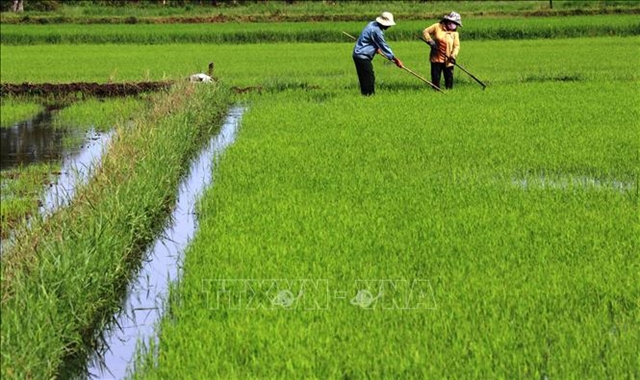 Society
Society

 |
| Tây Ninh Province aims to become the region's high-tech agricultural processing and export hub through strong government support and efficient irrigation. — VNA/VNS Photo |
TÂY NINH — Tây Ninh Province is adopting high-tech, eco-friendly practices to achieve a low-emission and efficient farming system.
Hà Thanh Tùng, director of its agricultural extension centre, said the province irrigation systems enable effective water control, reducing emissions while maintaining productivity.
Local agriculture also incorporates new cultivation models and techniques that save water and reduce methane emissions.
A good example is the “alternate wetting and drying” smart rice farming model combined with the “one must - five reductions” technique.
This involves alternating between flooding and drying rice fields, which improves rice plant growth while reducing the use of water, fertilisers and pesticides.
The “one must - five reductions” technique requires using certified rice seeds and reducing the use of seeds, fertilisers, pesticides, water, and post-harvest losses.
Nguyễn Văn Lành, a member of the An Bình Agricultural Service Cooperative in Tây Ninh Province, said rice farming used to cost around VNĐ15 million per hectare, but dropped to VNĐ10 million when he used the new methods, increasing his profit by VNĐ5 million per hectare.
Water usage has decreased by nearly 40 per cent while productivity has increased by over 15 per cent, he added.
According to Nguyễn Văn Luôn, director of the cooperative, the irrigation canal network is now concreted, which ensures stable water supply.
Tây Ninh Province is expanding this rice farming model to other cooperatives, aiming to popularise its use across all rice cultivation areas.
Nguyễn Đình Xuân, director of the provincial Department of Agriculture and Environment, said the province has implemented a range of solutions like completing irrigation infrastructure, fostering cooperation with businesses, accelerating technology transfer, and organising production along value chains.
Nguyễn Tuấn Anh, a grower of Japanese baby cucumbers in Tây Ninh City, said the crop requires high humidity and clean water.
With canals running close to his farm and possessing drip irrigation technology and modern net houses, he can now maintain ideal humidity, limit pests and avoid the use of chemical pesticides, he said.
Nguyễn Trung Đông of Ba Den Farm said he has achieved European-standard organic grape cultivation partly due to the expansion of the irrigation system.
Future goals
Tây Ninh Province is building a green and modern agricultural production ecosystem, with 31 per cent of its cultivated land utilising water-saving irrigation technology.
This helps reduce costs, conserve water and increase land use efficiency.
The province is also applying biotechnology, using natural predators instead of chemicals and promoting organic agriculture.
Moreover, there are support programmes for local farmers and agriculture businesses like preferential credit, assistance in obtaining GAP standard certification, trade promotion, and the development of OCOP products.
The province aims to develop concentrated production areas linked to processing and exports, and build sustainable agricultural value chains by 2030.
It focuses on cooperating with businesses, training farmers in financial management skills, providing preferential loans, and continuing to invest in the irrigation system.
Xuân, the agriculture department director, said investing in irrigation and high-tech agriculture is a long-term strategy to enhance productivity, quality and competitiveness.
The province aims to become the high-tech agricultural processing and export hub in the region, he added. — VNS




